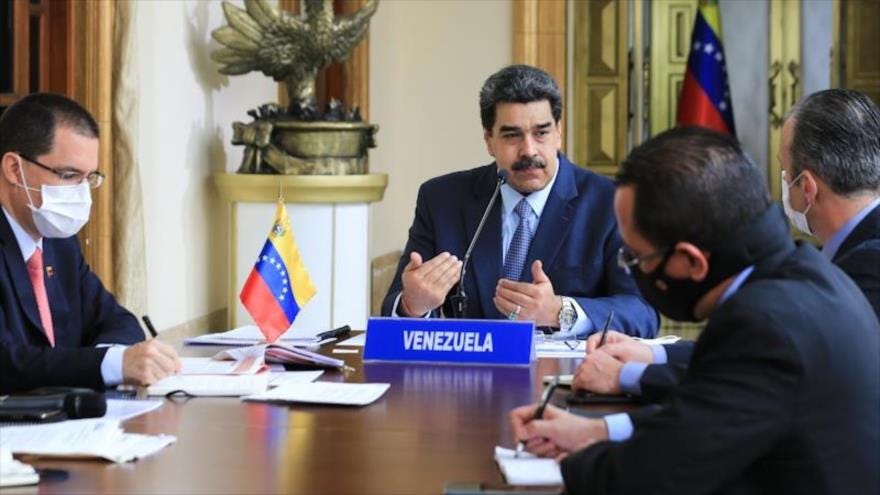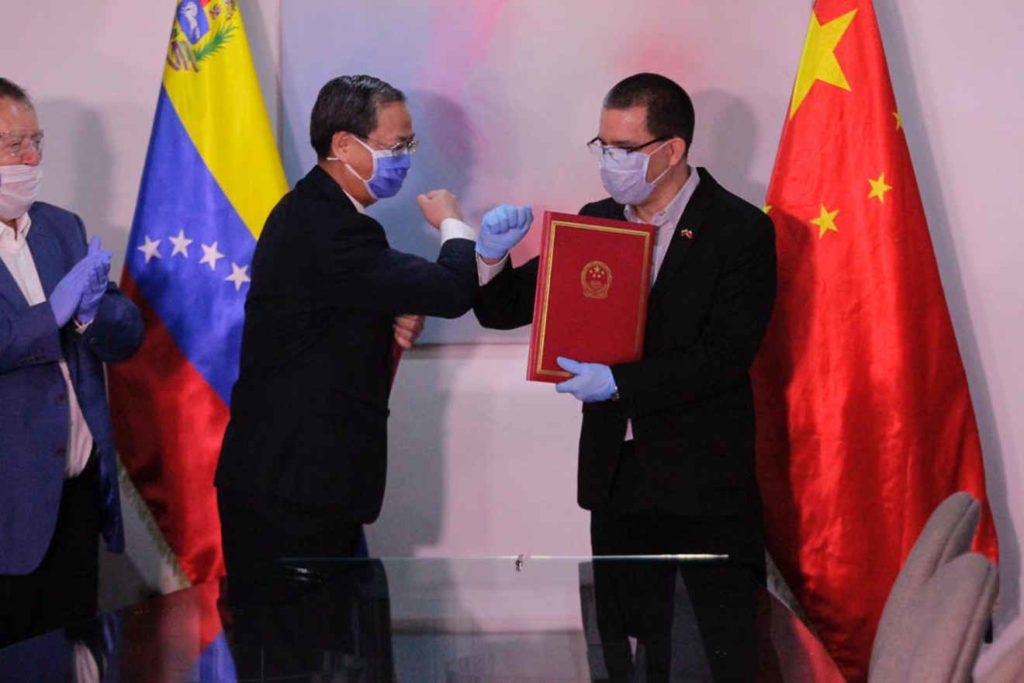Theory and Practice of Venezuelan Multilateralism in Times of Pandemic and Threats


Orinoco Tribune – News and opinion pieces about Venezuela and beyond
From Venezuela and made by Venezuelan Chavistas

By Franco Vielma – Jul 1, 2020
By hardening its siege tools against Venezuela, the US government began to openly implement a policy of isolation against the oil producing nation that has evolved into the current and sordid political and economic blockade.
They launched a roadmap of unilateral coercive measures that have given “legal” form to the political conspiracy that had preceded the US siege against Venezuela.
The essential purposes of this were always to degrade Venezuela’s international relations, to break it as an actor in the recomposition of the international energy market, to stop its regional influence and to contain the rise of leftist forces on the continent.
The creation of a full spectrum crisis in the country, by means of a parallel government, the blockade, the promotion of internal sedition and fueling the mercenary war, have in fact been factors that have divided politics in the Western Hemisphere in a Manichean manner: either one is in favor or one is against the Venezuelan government.
The circumstances that made Venezuela a critical crux accelerated the destruction of continental institutionality.
The worn out Organization of American States (OAS), the de facto dissolution of the Union of South American Nations (UNASUR) and the rise of the “Lima Group” as a body without institutional legality, but as a forum to encourage the dismantling of Venezuela, are unequivocal signs of a breakdown in international relations from and beyond Caracas.
Venezuela’s former relations with the European Union (EU), which are heated today, after the hostilities of the old continent in adherence to the Washington agenda, have accelerated the diplomatic breakdown and all institutional sobriety.
In summary, the picture resulting from this articulated destruction and accompanied by this framework of political relations as we knew them, has forced the Caribbean nation to redesign its foreign policy scheme, yes, on solid foundations of a very dynamic diplomatic scheme built in the years of Chavismo that preceded the blockade.
RELATED CONTENT: Putin on 75th Anniversary of WWII: Shared Responsibility to History and Future

The new multilateralism in the face of the pandemic, war and blockade
The times in which despite the differences with Washington, Venezuela sold crude oil to the US, ended. The times when Venezuela had a constructive relationship with the EU are gone. The times in which, despite political atomization and regional interests, Venezuela kept relations with certain neighboring countries, have ended. It is unspeakable to talk of perpetual paralysis in these diplomatic synergies, but the momentary picture is this and political times do not wait, they continue flowing.
From there, the Bolivarian nation has had to recast its framework of relations, strengthening recently established strategic alliances. As we know, Russia, China, Iran and their allies in the Bolivarian Alternative for the Americas (ALBA-TCP), especially Cuba and Nicaragua, have been the denominators of a new multilateralism.
Venezuela is going through the hardest times today in which it has had to implement its new alliances like never before and the multilateralism that it has had to build according to circumstances.
In the years in which the US blockade has become more pronounced, precisely in 2020 when Washington decided to apply “maximum pressure” to bring down the country in the face of the US presidential elections, the Covid-19 pandemic ensued, decanting a global health crisis which in Venezuela has had the additional ingredient of the noise of the drumbeat of war.
There are some indispensable milestones that must necessarily be mentioned in the context of the Venezuelan situation at the time.
The collaborations of China and Russia with huge medical supplies breaching the blockade, as well as the support of Cuba, have ruined the possibilities of a pretended and fabricated “humanitarian crisis” in the country.
The arrival of Iranian ships with gasoline and refining additives in the country, as well as the arrival of technological equipment for Venezuelan refineries, is helping to wreck an energy crisis and internal chaos tailored to the blockade. All in open defiance and open breach of the naval encirclement and under the noses of American military ships.
ALBA-TCP has met remotely, including with the accompaniment of the Economic Commission for Latin America (ECLAC), to rethink the subregional economy in times of pandemic, as no instance of degraded continental institutionality has done today. The objective is to strengthen cooperation, relaunch social agendas and formulate a space for political, economic and health insurance.
The threat of unleashing a mercenary war in Venezuela, as happened with the failed Operation Gideon, has redefined Venezuela’s position as a knot in “strategic security” on this side of the world.
The increasingly real possibilities of conflict put Venezuela back on the UN Security Council, underscoring the warning points. The role of Russia and other allies in the face of these alleged attacks have been key to formulating the need to break the increasingly fragile “consensus” around the blockade and the construction of a war in Venezuela.
RELATED CONTENT: Russia Labels as “Outrageous” UK Decision to Deliver Venezuelan Gold to Guaido

In other words, such adverse times have accelerated that Venezuelan relations and the country’s own situation acquire a new dynamism and that the ties be deepened in new ways with actors that were unthinkable more than two decades ago.
Characteristic factors of this moment are the relevance, the pragmatism, the opportunity, the ordering of priorities and the alignment of approaches. Overcoming the pandemic, disrupting and breaking the blockade, securing the territory, withstanding the onslaught of political isolation and gauging the changes of time in international relations, are the components of Venezuelan politics that today are redesigned for local consumption and for its external front.
Venezuela in “The Axis of Evil”
When the US fully added Venezuela in what they call the “Axis of Evil”, the gravitations for the oil producing nation changed so drastically that they made it the most uncomfortable knot in international politics in the West in the recent era.
A nation rich in crude oil, an oil factory historically related to the United States, the epicenter of the clash between the interests of traditional hegemonies versus emerging countries, vertex of the new regional left, the country with the most dynamic relations with Eurasia and its centers of power, the nation that knew how to build an anti-hegemonic alliance on the American continent, in short, Venezuela is all those contradictions.
These have drawn the forcefulness with which the US government has implemented its scheme to dismantle the country. With the differences that apply to the case, Venezuela is in political terms a Syria, a Levant, anchored in the West. It is a strategic step, a disputed area, an inescapable fork.
Much has been said, but reaffirming it does not wear down the concept. If Venezuela falls, there will be a substantial loss of balance and the necessary checks and balances that the world needs, not only in energy, it is also the case in politics. The hecatomb of a turbulent world, with a current health crisis, a great depression in the making and then the great socio-environmental crisis that awaits us, will be spasms that will demand a recomposition of the world’s power relations and not the regression to the old gravitations that the West imposed in its favor.
Without wishing to exaggerate, Latin America needs Venezuela and ALBA-TCP as counter-hegemonic bastions and a viable model of alternative political and economic relations to neoliberalism on the continent. Emerging countries need access to the energy that Venezuela can provide. China and Russia need to further develop their influence in this hemisphere to facilitate their position as power figures in counterweight to the United States, and this goes as well for the commercial, energy and military spheres.
The world in dispute today has the crossroads of old asymmetries and the new framework of multi-centric realities. And all these roads, paraphrasing that old saying, “lead to Venezuela.”
Featured image: Venezuelan Foreign Minister Jorge Arreaza. Photo: Archive
OT/JRE/EF